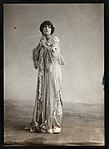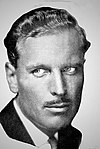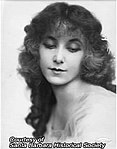The Right to Be Happy: Difference between revisions
m Disambiguated: curmudgeon → wikt:curmudgeon |
|||
| Line 23: | Line 23: | ||
==Plot== |
==Plot== |
||
The film is a retelling of Charles Dickens' ''A Christmas Carol'', recounting the story of Ebenezer Scrooge, played by [[Rupert Julian]]. Scrooge is an elderly [[miser]] and [[curmudgeon]]. Alone in his room on Christmas Eve, he is visited by the ghost of his former business partner Jacob Marley ([[Harry Carter (actor)|Harry Carter]]). Marley’s ghost tells Scrooge three spirits will visit him over the next three nights. |
The film is a retelling of Charles Dickens' ''A Christmas Carol'', recounting the story of Ebenezer Scrooge, played by [[Rupert Julian]]. Scrooge is an elderly [[miser]] and [[wikt:curmudgeon|curmudgeon]]. Alone in his room on Christmas Eve, he is visited by the ghost of his former business partner Jacob Marley ([[Harry Carter (actor)|Harry Carter]]). Marley’s ghost tells Scrooge three spirits will visit him over the next three nights. |
||
Scrooge's first visit is by the Ghost of Christmas Past ([[Wadsworth Harris]]). The Ghost shows Scrooge's development from a young boy to a young man. He sees how he started to become a miser. |
Scrooge's first visit is by the Ghost of Christmas Past ([[Wadsworth Harris]]). The Ghost shows Scrooge's development from a young boy to a young man. He sees how he started to become a miser. |
||
Revision as of 11:52, 11 December 2020
| The Right to Be Happy | |
|---|---|
 The Moving Picture World Ad | |
| Directed by | Rupert Julian |
| Screenplay by | Elliott J. Clawson |
| Based on | A Christmas Carol by Charles Dickens |
| Starring | |
| Cinematography | Stephen Rounds |
Production company | |
| Distributed by | Universal |
Release date |
|
Running time | 5 reels (est. 55 minutes) |
| Country | United States |
| Language | Silent (English intertitles |
The Right to Be Happy is a 1916 American silent Christmas fantasy film directed by Rupert Julian, based on the novel A Christmas Carol by Charles Dickens. Starring Julian and Claire McDowell, the photoplay was produced by the Bluebird Photoplays and released on December 15, 1916, by Universal.[1][2]
Plot
The film is a retelling of Charles Dickens' A Christmas Carol, recounting the story of Ebenezer Scrooge, played by Rupert Julian. Scrooge is an elderly miser and curmudgeon. Alone in his room on Christmas Eve, he is visited by the ghost of his former business partner Jacob Marley (Harry Carter). Marley’s ghost tells Scrooge three spirits will visit him over the next three nights.
Scrooge's first visit is by the Ghost of Christmas Past (Wadsworth Harris). The Ghost shows Scrooge's development from a young boy to a young man. He sees how he started to become a miser.
Then, the Ghost of the Christmas Present (Richard L'Estrange) appears, who shows Scrooge how the Cratchit family has fared. He finds out, unless the future changes, the Cratchit's disabled son, Tiny Tim (Frankie Lee), will die.
The last spirit Scrooge meets is the Ghost of Christmas Yet to Come (Tom Figee). This figure shows Scrooge scenes of people discussing someone's death. Nobody in the room seems concerned about the dead person. Scrooge doesn't know who the dead man is. Then, he finds out Tiny Tim has also passed. Next, Scrooge discovers he is the man whose death is celebrated.
He vows to change his ways and become a new person. Finally, Scrooge wakes up at home and finds out all the spiritual visits happened one night. He also finds out today is Christmas Day.
Each visit positively changed Scrooge; he transforms into a kinder, gentler man full of Christmas spirit.
Cast
Actor Role Rupert Julian Ebenezer Scrooge John Cook Bob Cratchit Claire McDowell Mrs. Cratchit Frankie Lee Tiny Tim Harry Carter Jacob Marley Emory Johnson Fred, Scrooge's Nephew Francelia Billington Scrooge's Sweetheart Lydia Yeamans Titus Mrs. Fezziwig Wadsworth Harris The Ghost of the Past Richard L'Estrange The Ghost of the Present Tom Figee The Ghost of the Future Roberta Wilson Caroline
Preservation status
According to the Library of Congress website, no copies survive.[3]
References
- ^ "The Right to Be Happy". catalog.afi.com.
- ^ "The Right to Be Happy". www.tcm.com.
- ^ "The Right to Be Happy / Rupert Julian [motion picture]". www.loc.gov/film-and-videos/.








